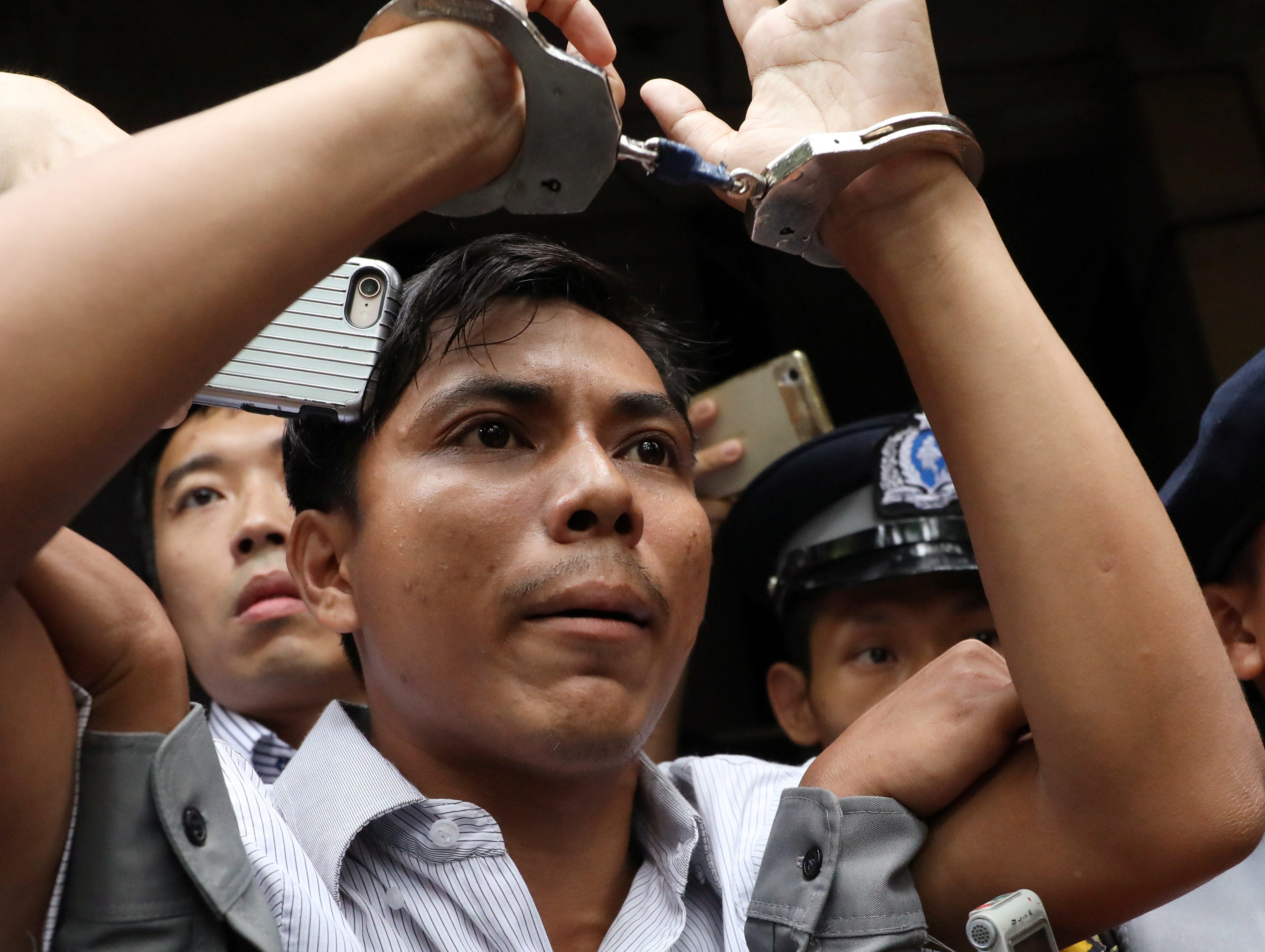
The jailing of two Reuters reporters for “doing their jobs” and reporting on the massacre of Rohingya Muslims in Myanmar has been internationally condemned, including in a number of UK newspapers.
Both men, who have been detained since their arrest in December last year, had pleaded not guilty, contending they were framed by police.
The pair had been reporting on Myanmar military action against Rohingya Muslims in the country’s Buddhist Rakhine region, where some 650,000 people have been displaced fleeing violence.
Investigators working for the UN’s top human rights body said last week that genocide charges should be brought against senior Burma military officers over the crackdown.
The accusation of genocide was rejected by Burma’s government, but is the most serious official recommendation for prosecution so far.
Privately-owned Myanmar newspaper 7 Day Daily blacked out a large section of its front page today in protest at the jailing of the reporters, with an editorial headlined: “A sad day for Myanmar.”
It read: “Giving a long sentence to two journalists ends the hope that the current government will value and respect the media freedom,” according to Antoni Slodkowski, Reuters bureau chief in Myanmar, on Twitter.
“The government is the first one who lost because it receives the reputation of oppressing the media just like junta governments.”
A number of UK newspapers also showed support for Lone and Soe Oo and called for diplomatic pressure and sanctions to be put on Myanmar for its atrocities.
The Financial Times said last night the charges and the trial were “travesties of justice, designed to intimidate the press and discourage further scrutiny of the army campaign against minority Rohingya Muslims”.
The newspaper called for international pressure to be put on the country’s army and leadership, saying: “Whatever democratic gains were made five years ago when political prisoners were released and the press unmuzzled are now being reversed. The jailing of the two Reuters reporters is a case in point.
“Meanwhile, impunity for the real perpetrators of crimes is entrenched. Neither the civilian authorities nor the military can be trusted to hold them to account.”
The Telegraph questioned whether the world would know what had happened to the Rohingya people if it were not for the free press, and said Myanmar’s “crackdown on journalists” was a “grim reminder of the value of exposing crimes”.
It added: “…the verdict also underscores the vital importance of a free press and civil society. Were it not for reporters and NGOs who shone light into this ‘information black hole’, Burmese authorities might indeed have been able to suppress all memory of their crimes.
“Sadly, we in Britain cannot be too smug: in this year’s World Press Freedom Index we slid down to 40th place, among the worst in western Europe, due to heavy-handed legislation and vicious threats against journalists. We must strive to remain an example to the world.”
The Independent said the case “should concern every journalist and media organisation” in the world.
“From Gaza, Moscow, Malta and Zimbabwe to Donald Trump rallies in the United States, the safety of journalists is being compromised,” it added.
“There is an old cliche that journalism is about telling the world things that some people wish the world not to know, and every time a journalist is jostled, obstructed, arrested, assaulted or even assassinated the whole world becomes less open and free, because human rights are universal and the right to know respects no national frontiers.”
The newspaper added that despite the increasing demonisation by populist politicians and authoritian regimes of the media for telling “fake news”, the truth is “journalists are simply doing their jobs as they always have, and are finding it more hazardous”.
Foreign Secretary Jeremy Hunt said yesterday he would raise the reporters’ case on his upcoming visit to Myanmar, which he initially announced last week after the UN called for genocide charges against military leaders.
International campaigning group Reporters Without Borders called yesterday a “dark day for press freedom in Myanmar”.
Secretary-general Christophe Deloire said: “As the justice system clearly followed orders in this case, we call on the country’s most senior officials, starting with government leader Aung San Suu Kyi, to free these journalists, whose only crime was to do their job.
“After a farcical prosecution, this outrageous verdict clearly calls into question Myanmar’s transition to democracy.”
Myanmar’s Deputy Information Minister Aung Hla Tun denied the verdict was a blow to press freedom, according to Reuters.
However he acknowledged some laws were “not friendly” to the media, including the Official Secrets Act under which the two reporters were convicted.
“This legislation was not enacted by this government, we inherited it,” he told Reuters. “We’re trying to review the laws. Some will be abolished, if necessary, and some amended.”
Myanmar is ranked 137th out of 180 countries in the 2018 World Press Freedom Index.
Picture: Reuters/Ann Wang
Email pged@pressgazette.co.uk to point out mistakes, provide story tips or send in a letter for publication on our "Letters Page" blog
